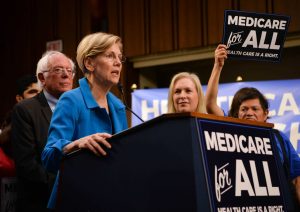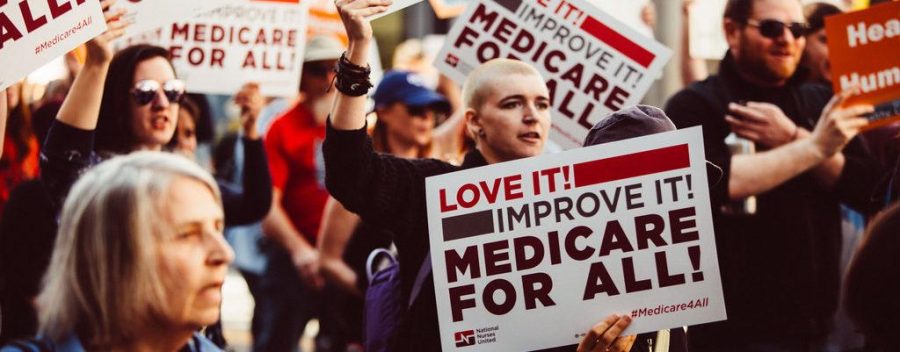Slide image courtesy of Flickr.
The concept of “Medicare-For-All” has influenced a country-wide conversation about improving healthcare in America. With many Democrats across the country campaigning for it in 2018, “Medicare-For-All” has become a major theme in this year’s midterm election cycle. But many questions arise about “Medicare-For-All” and its potential impact. What is it? What would it involve? Would it save the country money? And most importantly, would it provide Americans with better healthcare?

Let’s start off with what it actually is. While Medicare-For-All is an umbrella term that consists of differing plans, some more reformatory than others, Medicare-For-All has historically meant single-payer health insurance. That means a fully national, government-run program that would cover every American and replace private healthcare coverage and insurers. Every American would receive an insurance card showing they are covered under Medicare-For-All. One would present this card whenever they needed medical products or services. The system would operate similarly to government-run healthcare systems currently employed in Canada, Israel, and some European countries.
In the political arena, this idea started to take shape in 2003 when Former Rep. John Conyers (D-Mich.) first introduced the Expanded and Improved Medicare for All Act (H.R. 676 2003-2004). Currently this idea most prominently manifests itself in Sen. Bernie Sanders (I-Vt.)’s Medicare for All Act of 2017 (S.1804 2017-2018), a major component of his presidential run.
The financial commitment required to enact Medicare-For-All would likely be significant. Additionally, the savings it would bring, or lack thereof, are disputed. According to a study put out by the Koch brother financed Mercatus Center at George Mason University, Sanders’ Medicare- For-All plan would cost $32.6 trillion over 10 years.

The study envisions two separate scenarios that could occur should Medicare-For-All legally become the new standard. The first scenario is total health care expenditures would fall by $2.054 trillion over the next 10 years. To get that figure, the study used a relatively generous assumption regarding how well Sanders’ plan would curtail health care costs. It assumes that payment to medical providers will be reduced to current Medicare levels, that governmental negotiation with prescription drug makers will cause significant savings, and that administrative costs will be cut from 13 percent to six percent. The second scenario is that over the same 10-year period, total health care expenditures would actually increase by $3.252 trillion.
Clearly, instituting such a robust system designed to cover every single American, even if possible, would not come cheap. And even though the idea of Medicare-For-All is a system intended to reduce national spending on healthcare overall, savings are not guaranteed. So is it worth it? Is such a system feasible?
“While progress has been made in our healthcare system in recent years, there is more work to be done,” says Rep. Brett Parker, a Democratic member of the Kansas House of Representatives, representing District 29. Regarding national healthcare, America’s “goal must be universal coverage,” says Parker, praising the Medicare-For-All movement for helping to drive a conversation about reform to that end. Parker adds, however, that “there are many ways to achieve the goal” of national universal coverage other than Medicare-For-All.
“Healthcare in America is a very complicated topic, and unfortunately, I don’t think there is a simple, cost effective, high quality solution,” says Dr. Kelly Kreisler, a pediatrician at KU Medical Center. Kreisler views Medicare-For-All as “more of a slogan than an actual proposal at this point.”
Notwithstanding, “our system is clearly in need of an overhaul as we spend the most money on health care with some of the poorest outcomes in the developed world.” The Affordable Care Act, according to Kreisler, was a step in the right direction concerning improving healthcare in the United States. It is not, however, perfect. In her line of work, Kreisler sees “hard working individuals forgo needed medical care or become bankrupt from medical bills they can’t afford to pay.” The key to improving healthcare for all, according to Kreisler, is fixing the Affordable Care Act so it works for everyone. And to do that, Kreisler says, we have to depoliticize healthcare.
The main solution to our healthcare problem is “less government instead of more government, leveling the playing field, and put[ting] the system into the hands of somebody who knows how to balance a budget,” says Dr. Tim Standlee, an anesthesiologist at Olathe Medical Center. Based on those parameters, Standlee does not see a national healthcare system that covers every American as realistic.
According to Standlee, “the capitalist system has done an incredibly good job of making sure there is competition” regarding healthcare choices in this country. Competition incentivizes healthcare providers to maintain a good, efficient system for consumers as anyone can switch providers should they find one that would better serve them. A system like Medicare-For-All, according to Standlee, would take away that pro-consumer, cost-saving incentive.
Additionally, the politics surrounding the federal government in general and the federal budget process in particular would cause a system like Medicare-For-All to be “inherently very inefficient, more [expensive], and also fraught with way too many ways to have the system taken advantage of.”
Regarding healthcare in the United States, one thing is clear: It is a complex, multifaceted issue, and it is important to actively consider and compare its varying viewpoints. Surely, it would be ideal if everyone in this country had access to quality healthcare. This is an admirable goal for which to strive. But is Medicare-For-All the answer? Opinions vary. What we all hold in common, however, is the desire to attain the best and most affordable health insurance possible.










































































